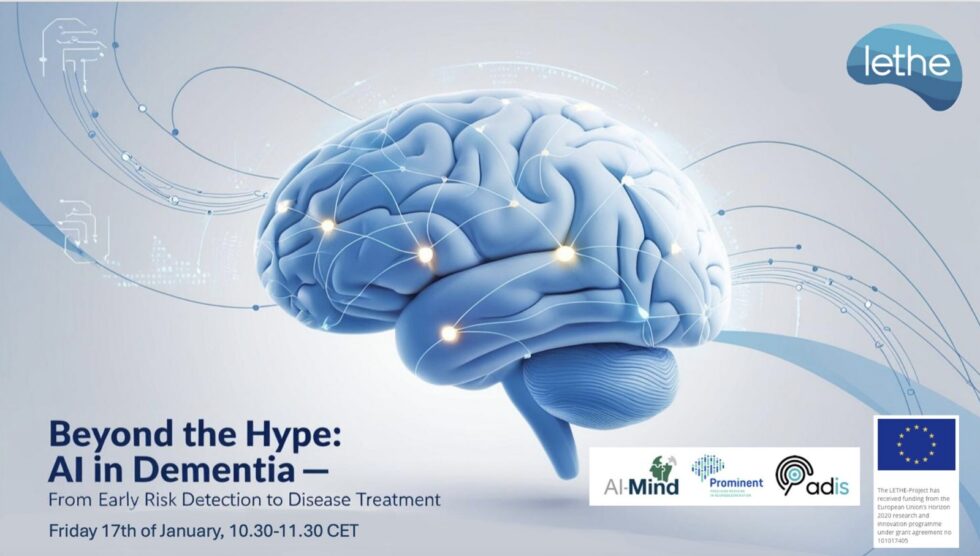In the context of the ADIS project, Alzheimer Europe (AE) in close collaboration with the Fundació Clínic per a la Recerca Biomèdica (FCRB) and the Confederación Española de Alzheimer (CEAFA), set up the ADIS advisory board (ADIS AB) at the end of 2022. The ADIS AB is composed of 5 members with Mild Cognitive Impairment due to Alzheimer’s disease (MCI due to AD*), which is sometimes called “prodromal AD”. In addition to the ADIS AB, the members of the European Working Group of People with Dementia (EWGPWD), who have dementia due to different neurodegenerative diseases, have also taken part in several consultations in the context of Public Involvement. Two of these consultations with the ADIS AB and the EWGPWD focused on the value (and challenges) of diagnosing AD before the stage of dementia.
During the consultations, we asked the members of the EWGPWD and the ADIS AB about the value of people knowing that they have MCI due to AD or AD dementia* for researchers and for the person being told this information.
A diagnosis of MCI due to AD is perceived as highly important for researchers, as this would enable them to understand better how the disease starts and how it progresses. Identifying individuals with MCI due to AD is also highly relevant in the context of clinical trials for the development of new drugs targeting the disease in individuals in the early stage.
When it comes to the value of knowing that someone has MCI due to AD over AD dementia for the person receiving this information, four main issues were highlighted by the members of the EWGPWD and the ADIS AB during the consultations: relief, access to pharmacological treatment, planification of future needs, and maintenance of emotional health and psychological well-being.
People with AD start experiencing mild symptoms in the MCI stage. Being diagnosed at this early stage of the disease was considered very valuable for the members consulted, as this information enables them to name these symptoms and start doing something about them that might prevent the disease from progressing to the dementia stage (e.g. pharmacological treatments, lifestyle changes etc.).
Although receiving a proper diagnosis is a right, some members of the EWGPWD and the ADIS AB stressed the difficulties they had during this process, in terms of the time needed to get an appointment with the healthcare specialist and the struggles experienced to be diagnosed properly. Therefore, being able to name the symptoms, as soon as they started experiencing them, was described, by some of them, as a “relief” or a “good feeling”.
Receiving a proper diagnosis and information about the stage of the disease someone is at were also considered relevant and very valuable to plan future needs, such as care, support, finances and housing adaptations, and decide the level of family involvement in the decision-making process of that planification. It was mentioned that, when someone has MCI due to AD, that person can probably make decisions about their own future needs, whereas having AD dementia may require the family to be involved in the planification of more immediate needs.
Finally, it was also highlighted the importance of an early AD diagnosis to maintain psychological well-being since the onset of symptoms. Some members of the ADIS AB mentioned the importance of support groups, workshops and activities where people with the disease can interact with other people the same age and with the same problem. These activities, workshops and groups are neither pharmacological nor non-pharmacological treatments, but can still provide, as they stressed, the emotional and psychological support needed after being told the diagnosis.
Although receiving a diagnosis of MCI due to AD is perceived as valuable and relevant by the ADIS AB and the EWGPWD, some members involved in these consultations highlighted that the current problem of an early diagnosis is the young ages (below 65 years old) of the people with MCI due to AD. At this young age, people may still have a family to provide for and a job that, in some countries, they may lose as soon as they receive a diagnosis of AD. It was mentioned that the existing resources, mostly in the healthcare and employment systems, do not respond to the needs of this group of young people with many of their functional abilities still retained. These challenges in the healthcare and employment system should be overcome if societies want to be prepared for an early diagnosis of AD which is to become more and more frequent in research studies and clinical practice.
Most of the members of the ADIS AB highlighted some of these challenges and mentioned the difficulties they had getting an appointment with the healthcare specialist, receiving a proper diagnosis, being followed up after the diagnosis and receiving post-counselling or post-diagnostic support. They stressed that continuous assessments and monitoring of the disease progression in people with MCI due to AD are essential, so they can continue adopting healthy lifestyle habits that benefit them and keep on doing what they like and want for as long as they can. Post-counselling is also essential and, as some members of the ADIS AB mentioned, it should require healthcare professionals to inform about national and regional Alzheimer’s associations that a person with AD could join and where that person could be supported to keep connections with society and to meet other people with the same disease, amongst other things. Post-diagnostic support was considered very valuable by some members consulted to maintain and promote their psychological well-being and, as it was also mentioned, it should be guaranteed to everyone with AD, regardless of the geographical region where they live, the economic resources they have and the stage of the disease they are at.
The members of the ADIS AB also stressed that support should also come from employers. People with MCI due to AD may be in a phase of their lives where they still work and have family responsibilities. It is therefore essential that they can keep working for as long as they can and want after the diagnosis. If people with AD can no longer have the same job responsibilities, employers should offer them a job position that is adapted to their abilities and the individual disease progression.
*MCI due to AD: the predementia stage of AD in which cognitive symptoms are not severe enough to significantly affect everyday activities.
*AD dementia: the stage of AD in which the cognitive symptoms are severe enough to affect daily life activities.





